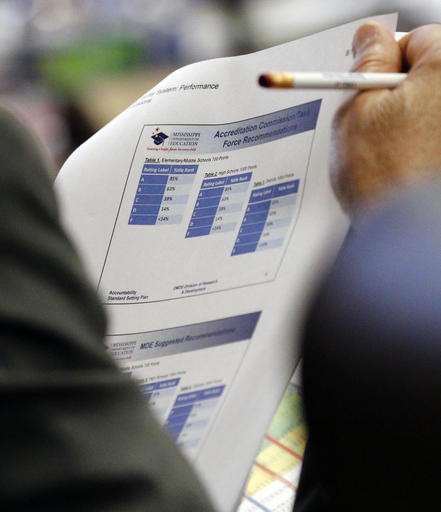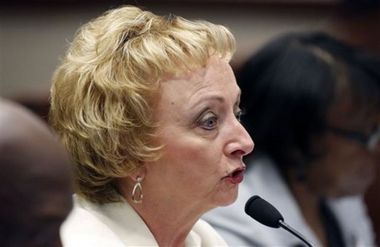

Rogelio V. Solis/The Associated Press
JACKSON, Mississippi (AP) — Beneath the back-and-forth last week over how many Mississippi public schools should get As was the undertow of another question — has the state gone from grading its kids too soft to grading them too hard?
In many ways, it’s a deeper issue than assigning A-to-F grades to schools. Reducing the performance of a school or a school district to a single word or letter has always been something of an arbitrary exercise. It’s easy for laypeople to have opinions about how many schools should get As or Fs if presented with data about how many students are proficient in academic subjects or how many students are graduating.
But ask the next-level down question: how do you tell whether a fifth-grader is proficient in math, or working on grade level? What do the words proficient or grade-level even mean? Does a student have to demonstrate complete mastery of the state’s academic standards, or is proficiency something less than that?
For a long time, critics said Mississippi had set its bar for proficiency too low. They pointed to the gap between the relatively large shares of students who got good ratings on the old version of Mississippi’s standardized tests, versus the smaller share who scored well on the National Assessment of Educational Progress. That’s not supposed to be the case any more on the new Mississippi Assessment Program.
“Was the Mississippi Assessment Program rigorous? The answer is yes. They were designed that way,” J.P. Beaudoin, the Mississippi Department of Education’s chief of research and development, told the state Board of Education Thursday.
But Mississippi educators reading a recent study by testing and software company Renaissance Learning asked whether current standards are too hard. The company makes the Star testing software that most Mississippi districts use to track reading performance in young students and predict test outcomes. The company did a study that found that a third grade student had to read on a level equivalent to grade 4.7 to be considered proficient on the test Mississippi students took in 2015. An advanced student would need to read at a grade equivalent of 8.1.
Renaissance did not do a study linking Star scores to the MAP test, but it’s supposed to test the same standards as the 2015 test and be equally hard.
“What concerns us is that the rules of the game have changed considerably,” Tupelo Superintendent Gearl Loden wrote Aug. 1 in the Northeast Mississippi Daily Journal of the findings. “These requirements are simply not in the best interest of children.”
Loden’s article called a stir. Renaissance issued a statement through Mississippi officials Friday that downplays the interpretation that standards are set above grade level.
“If a student receives a grade equivalent of 4.7 on a Star assessment, this means that the student scores as well as the typical grade 4 student in the seventh month of instruction in that grade,” the company wrote. “It does not necessarily mean that the student has skill mastery at a fourth-grade level, only that he or she obtained a score as high as the typical fourth-grade, seventh-month student of those students participating in the study.”
Beaudoin Thursday strongly defended the tests. He acknowledged that students who are scoring at the top “advanced” level likely can read books meant for students several years older. But he said the Star results are being misinterpreted in part because it’s an adaptive test, meaning if a student answers a question correctly, the next one they get is harder.
“The Mississippi Assessment Program assesses students in each of the grade levels on the grade levels where they’re at,” Beaudoin said.




Be the first to comment